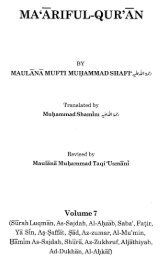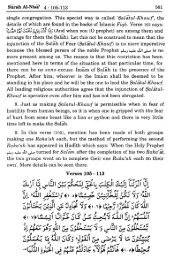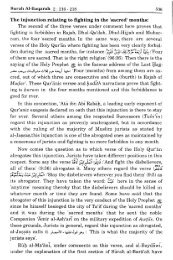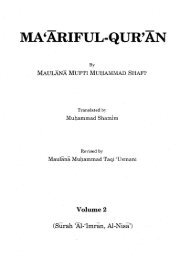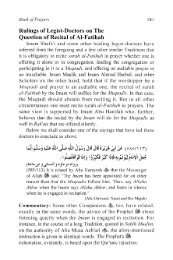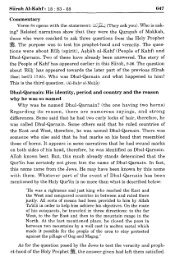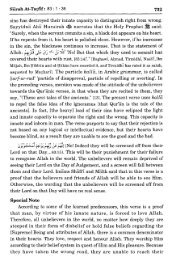Maariful Quran - Mufti Shafi Usmani RA - Vol - 4 - Page
Maariful Quran - Mufti Shafi Usmani RA - Vol - 4 - Page
Maariful Quran - Mufti Shafi Usmani RA - Vol - 4 - Page
Create successful ePaper yourself
Turn your PDF publications into a flip-book with our unique Google optimized e-Paper software.
Sirah Al-Taubah : 9 : 122 501the 'Alim is really nothing but a part of the legacy left by prophetswhich, according to the binding authority of Hadith, the 'mim inherits.At this point, we may also wish to consider that the blessed prophetsare known by two appellations: Bashir and Nadhir. You alreadyknow the meaning of nadhG (warner) from the preceding discussion.Bashir means one who gives bashiirah, that is, good news or glad tidings.It is a part of the mission of blessed prophets that they give gladtidings to those who act righteously. Though, at this place too, whathas been mentioned is Indhar or warning explicitly, yet, other textualimperatives show that it is also the duty of an 'Alim that he shouldgive good news of rewards too for those who do good deeds. Now thatthe mention of indhgr (warning) has been considered sufficient at thisplace has its reason. Actually, it indicates that man is charged withtwo things. One: that he elects to do what is beneficial for him in thisworld and in the world to come. Two: that he avoids doing things likelyto bring harm to him, People of learning and people of wisdom bothagree that the later of the two has the higher priority. In the terminologyof Muslim jurists, this is known as 'bringing benefit' and 'repellingharm' and the latter has been given precedence to the former. In additionto that, when harm is repelled, it serves the purpose of bringingbenefit in its own way, because if someone abandons what is beneficialand necessary for him, it brings harm. Given this situation, whoevermakes the effort to stay safe from the harmful effects of bad deeds willalso make the effort to stay away from leaving off what one must donecessarily.From here we also learn the main reason why religious sermonsand acts of da'wah generally remain ineffective in our time. We haveseen a glimpse of the cardinal etiquette of indhzr or warning, as givenabove. Contemporary sermons and acts of da'wah seem to miss themanners, something that would exude care, concern, attachment, mercyand the earnest wish to give out what is really good for the listeners,not only in words but through the style of address and the empathyof tone and diction as well. It would be wonderful if the addresseecomes to believe that the things the speaker is saying do not aim atdisgracing him or settling scores against him, in fact, this person istelling me what he thinks is good and beneficial for me just out of love.If the tablgh we do today or the da'wah we carry to correct people who



